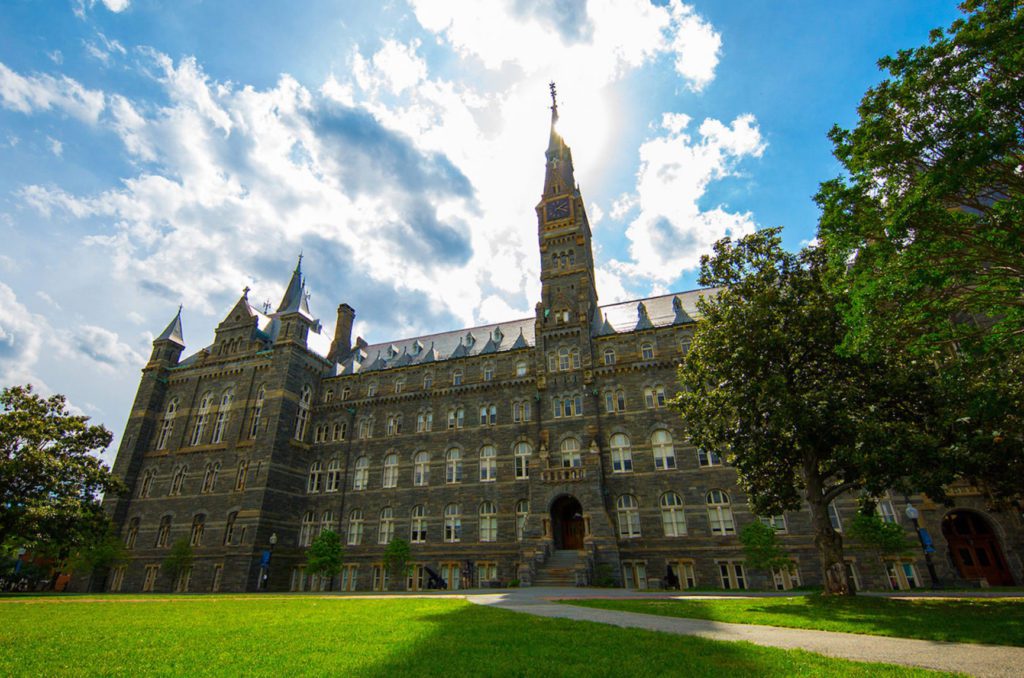G.U. and 15 Other Elite Universities Sued for Collusion
By • January 11, 2022 0 2363

Georgetown University has been named in an antitrust lawsuit alleging that it, along with 15 other prestigious mainly private universities, engaged in price fixing and unfairly limited student financial aid by using a shared methodology to calculate student applicants’ financial needs. This amounts to an antitrust violation, the lawsuit alleges, where the schools colluded together to determine how much financial aid would be awarded to students by taking into consideration student applicants’ ability to pay tuition.
The lawsuit, first reported by the Wall Street Journal Jan. 9, was filed by Roche Freeman, an Illinois law firm whose partner Eric Rosen was the lead prosecutor on the federal Varsity Blues college admissions-cheating investigation of 2019. Georgetown tennis coach Gordon Ernst was convicted and sentenced in that case in 2021. Some nine Georgetown parents also pleaded guilty of admissions bribery for their children.
“Georgetown and the other named universities have participated in a price-fixing cartel that is designed to reduce or eliminate financial aid as a locus of competition, and that in fact has artificially inflated the net price of attendance for students receiving financial aid,” according to the collusion lawsuit. While a federal law passed in 1994 allows schools to collaborate on their financial aid formulas, they can only do so if they don’t consider student applicants’ financial need when it comes to admissions decisions.
The 1994 legislation exempted schools such as Georgetown University, whose admission policies were considered to be need-blind — those who admitted students first without any financial data and then considering financial aid only after acceptance and based on need (Section 568 of the Higher Education Act). That law allowed need-blind schools to create common guidelines for how to assess a student applicant’s financial need for aid packages. But they were not allowed to discuss specific aid offers for individual students, in order to bypass bidding wars for low-income student applicants, while not being allowed to favor wealthier student applicants that could potentially lower the amount of scholarship money given away.
“While conspiring together on a method for awarding financial aid, which raises net tuition prices, defendants also consider the wealth of applicants and their families in making admissions decisions,” Rosen told the WSJ. The new lawsuit argues that groups of schools violated antitrust laws by favoring student applicants whose families are wealthy donors to the school. It also alleges that some of the schools considered student applicants’ finances when deciding to take them off the waitlist and for admission into certain school programs.
The new lawsuit demands a class action jury trial that would seek damages and a permanent end to schools’ ability to collaborate in calculating financial need and awarding aid. More than 170,000 former undergraduate students going back 18 years, who received partial financial aid at the 16 universities mentioned in the lawsuit, could be eligible to join the suit as plaintiffs, according to the New York Times. The lawsuit argues that these students were overcharged by “at least hundreds of millions of dollars”
The universities accused of wrongdoing are Brown, Cal Tech, the University of Chicago, Columbia, Cornell, Dartmouth, Duke, Emory, Georgetown, MIT, Northwestern, Notre Dame, the University of Pennsylvania, Rice, Vanderbilt and Yale. The 16 schools collaborate in an organization called the 568 Presidents Group that uses a consensus approach to evaluating a student’s ability to pay, according to the lawsuit.
“Georgetown University admits and enrolls students without regard to their financial circumstances and is committed to meeting the demonstrated financial need of eligible students through a combination of aid programs that include grants, scholarships, employment and loans from federal, state, private, and University resources,” said John J. DeGioia, Georgetown’s president and president of the steering committee of the 568 Presidents Group.
The Hoya, a campus student newspaper, quoted the financial aid page of Georgetown’s Office of Undergraduate Admissions website in a Jan. 11 article.
No official Georgetown University spokesperson responded to requests for interviews from the Hoya or other news outlets by press time.

